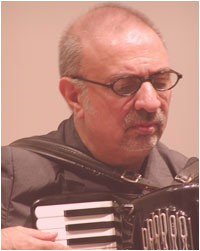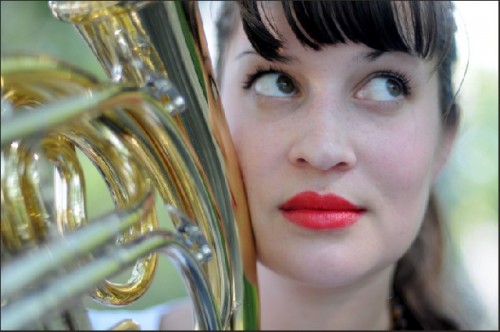International Contemporary Ensemble at Lincoln Center
Messiaen's Blackbirds Dance at Mostly Mozart
By: Susan Hall - Aug 12, 2012
International Contemporary Ensemble
Olivier Messiaen Le Merle Noir
Jonathan Harvey Bird Concerto with Pianosong
Schubert Octet in F Major
Jayce Ogren, Conductor
Joanna MacGregor, Piano
Claire Chase (Flute), David Bowlin (Violin), Eric Carlson (Violin), Maiya Papach (Viola), Katinka Kleijn (Cello), Randall Zigler (bass), Joshua Rubin (clarinet), Rebekah Heller (bassoon), Danielle Kuhlmann (horn).
Alice Tully Hall, Lincoln Center
New York, New York
August 11, 2012
The International Contemporary Ensemble (ICE) is a pride of Brooklyn and currently in residence at Lincoln Center for the Mostly Mozart Festival. Classical music forums try on different cloaks as they reach out to new audiences. ICE succeeds in their coat of many colors.
This year’s alliance with the Audubon Society is not as wacky as it sounds at first. Although bird walks in Central Park are included in the festival, they re-create the time a great composer like Olivier Messiaen spent recording the sounds of birds.
Birds use song to communicate. Chamber music is above all about musicians communicating with each other and on out to the audience. Birds warbling fit this mission well.
Poets and musicians have always been inspired by birdsong, which has to be slowed down to hear as music. One British scholar has heard Beethoven in the songs of the skylark and the woodlark in Bach's Preludes and Fugues.
Messiaen recorded bird sounds manually on paper and then re-created them in his work. His interest in birds became a prominent part of his music after the Second World War, most of which Messiaen spent in a prison camp. He wrote that the sounds of nature were the only true music. Perhaps music composed by humans had been irreparably tainted by the World Wars.
A delightful Messiaen composition, Le merle noir, began the program at Alice Tully Hall. Capturing the song of a blackbird, Claire Chase, a flutist who is also artistic director of the group, performed with Jacob Greenberg on piano. This piece started life as an audition work for flutists but its charms have come to outweigh its difficulties, and certainly as Chase soared you saw why. Delightful melodies plummeting through the hall, an aviary of the imagination.
The North American premier of the Bird Concerto with Pianosong by Jonathan Harvey was next up. The lively sound of Alice Tully was used as a jumping board to surround sound, moderated and directed by computers picking up the miked instruments, and sending them, according to specific direction of the composer, through five speakers positioned throughout the house. Melodies rushed and the cello even buzzed.
Jayce Ogren conducted with a cool aplomb, managing to make what might have been a chaotic rush of sound coherent and beautiful. At the piano, Joanna MacGregor performed both parts of the dual concerto. On the keyboard, she created background, with particularly arresting rumbling in the lower registers and ripping to the tinsel of the top, trying to stretch the piano as close as it could come to the birds' top, five octaves away, inaccessible to any instrument.
On a ‘sampler’ resting on the covered portion of the sounding board in front of the score, MacGregor called out the bird songs of 40 California natives, which the technicians then magnified and directed according to the composer’s specific instructions. MacGregor conveyed her pleasure in what must have been an extremely difficult performance of both parts of the dual concerto. The enrichment was integral to the proceedings in the hands of ICE sound engineer Levy Lorenzo.
Eric Lamb played the piccolo, the instrument closest to most bird sounds in nature. His wizardry sent you right into the forest amidst a cornucopia of sound. On the accordion, which sounded like nothing you’ve ever heard in a concert hall, William Schimmel also stood out.
Schubert’s Octet, composed for Count Troyer, an accomplished clarinetist who encouraged Schubert to use Beethoven’s Septet as his model. While Beethoven and Mozart can both be heard hovering under and over this piece, it is very much Schubert the songster, which ties the piece to the overall ‘birdsong’ concept.
Joshua Rubin on the clarinet met every challenge the composer offered up to his patron Count. Masterful, he soared, both eloquent and precise. David Bowlin led on the first violin, often in back and forth calls with the clarinet. Kleijn's cello solos were passionate and full of both longing and joy. Danielle Kuhlmann, also of the Genghis Barbie horn group, performed perhaps the most difficult lines, rendered rich and clear in her solos.
In the embrace of birdsong suggested by Messiaen, Harvey and Schubert, ICE glistened. They are in residence at Lincoln Center for the run of the festival. Fun and illuminating to check out.





